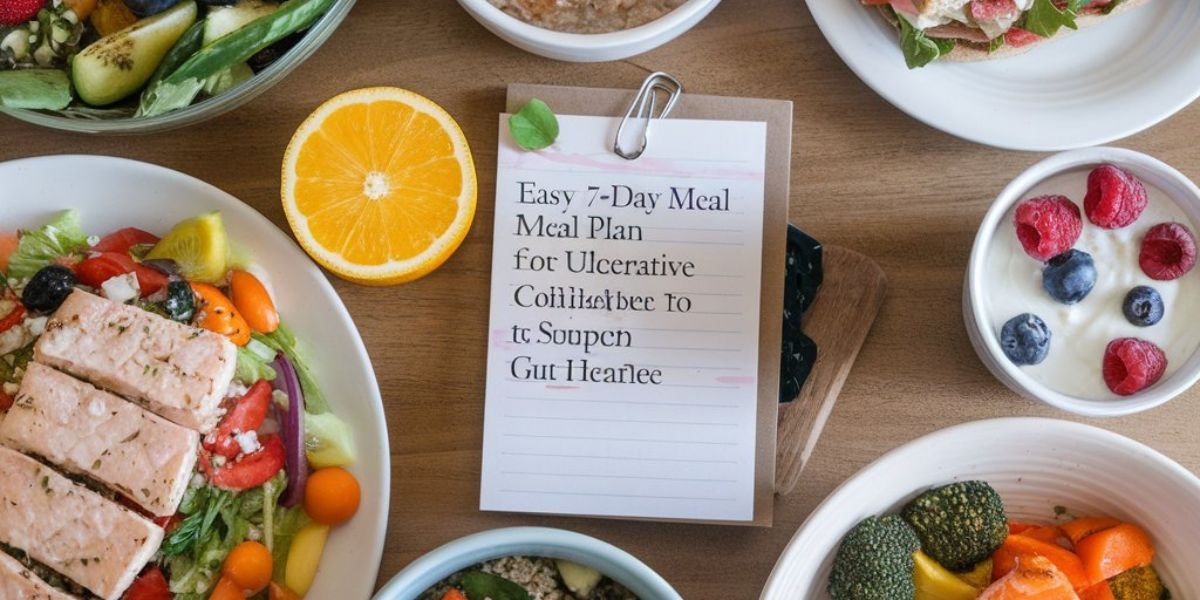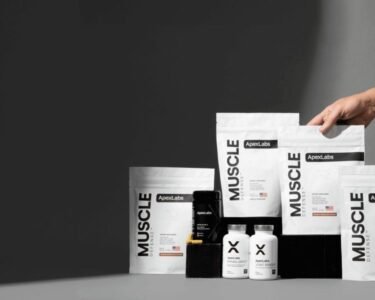Food is essential to life because it provides us with nourishment and energy and unites people via its mouthwatering flavours. Although eating may be difficult for those with ulcerative colitis (UC), they must make sure they eat a nutritious diet. For such people, a 7-day meal plan for ulcerative colitis will help them choose delicious foods that will fuel their bodies while reducing their ulcer symptoms.
This 7-day meal plan for ulcerative colitis free includes a wide range of meals from almost all food groups. Fruits, vegetables, grains, dairy products, and proteins are all part of this food plan. Good fats, such as olive oil, can support general health and benefit the digestive system. When used properly, food may become both enjoyable and helpful in managing ulcerative colitis (UC).
The Relationship Between Food and Ulcerative Colitis
Ulcerative colitis (UC) and food are strongly connected. Food can either help or worsen your symptoms, even if it doesn’t cause UC. Some foods can make your symptoms worse during flare-ups, but once your condition is under control, you may be free to eat normally and enjoy foods you usually avoid. Knowing which foods can help you feel better and which can make your condition worse can help you make smarter decisions and enjoy your meals to your best.
Why do Anti-Inflammatory Foods Matter?
Anti-inflammatory foods are quite beneficial, particularly for persons with ulcerative colitis. Turmeric, ginger, and berries are the best anti-inflammatory foods that can help in improving your gut health and reducing inflammation. By including them in your regular meals, you can significantly reduce symptoms of ulcerative colitis and enhance your overall well-being.
7-day meal plan for ulcerative colitis

When it comes to ulcerative colitis diet plan, people have different tastes and preferences. Understanding what foods in your ulcerative colitis diet plan will make you feel better is vital. To reduce symptoms of ulcers, you can also experiment with different food textures, cooking methods, and meal quantities.
If you have ulcerative colitis, you must try this easy 7-day meal plan for ulcerative colitis.
Day 1
- Breakfast: Blend a banana, protein powder, blueberries, and almond milk (or lactose-free milk) for a healthy breakfast. For extra nutrition, sprinkle ground flaxseeds on top. For a healthy fat boost, serve with whole wheat or gluten-free bread and mashed avocado.
- Lunch: For a light and healthy lunch, try baked chicken seasoned with low spices, served with steamed rice and roasted carrots brushed with olive oil. Include a small side salad with cherry tomatoes, Persian cucumber, and mixed greens that have been gently seasoned with lemon juice and olive oil.
- Dinner: Bake a filet of salmon seasoned with lemon juice, turmeric, and a pinch of salt for a flavorful and healthy dinner. Serve with peeled summer squash and baked sweet potatoes, all mixed with a little avocado oil and oregano.
- Snacks: A little fruit plate with slices of pear and a teaspoon of almond butter makes a simple and gut-friendly snack. For extra protein, serve it with a hard-boiled egg.
Day 2
- Breakfast: Eat scrambled eggs with toast for breakfast on the second day. To add more protein and healthy fats, serve with plain lactose-free yogurt with a drizzle of melted nut butter on top.
- Lunch: Put turkey and avocado in a normal or gluten-free tortilla and wrap it up for lunch on the second day. To make it crunchy, add a few shredded lettuce and tomato pieces.
- Dinner: Enjoy grilled chicken breast, lightly marinated in sauce, served with a side of white rice and steamed green beans.
- Snacks: For a healthy snack, try a protein plate with two hard-boiled eggs and smooth peanut butter on gluten-free crackers.
Day 3
- Breakfast: Serve chia seed pudding with fresh blueberries and a tablespoon of walnut butter.
- Lunch: For lunch, enjoy a hard-boiled egg and tuna salad made with lactose-free, nonfat Greek yogurt, served on bread or whole grain crackers. For a little sweetness, serve with a side of applesauce sprinkled with cinnamon.
- Dinner: Roasted turkey with roasted carrots and mashed potatoes is a great dinner option.
- Snacks: For a simple and soothing snack, try overnight chia pudding with almond milk and cinnamon. For extra taste and protein, serve it with a banana and a teaspoon of melted peanut butter.
Day 4
- Breakfast: Make your first smoothie with lactose-free (or almond) milk including a medium banana, two tablespoons of peanut or almond butter, unsweetened cocoa powder, ground flax seeds.
- Lunch: Enjoy a quinoa salad made with sliced bell pepper, tomatoes, cucumbers, and precooked quinoa. Make a basic dressing with olive oil, lemon juice, basil, salt, and pepper, and garnish with feta cheese and olives for taste. For extra protein, you can also add grilled chicken or chicken nuggets.
- Dinner: For dinner, enjoy grilled prawns marinated in a mild sauce, along with steamed broccoli and quinoa. This dish is calming and well-balanced because the shrimp offers lean protein and the quinoa and broccoli add fiber and vitamins.
- Snacks: A banana with peanut butter is a lighter snack, or try hard-boiled eggs with a side of lactose-free cottage cheese topped with a little honey.
Day 5
- Breakfast: Start your morning with a smooth bowl of oatmeal that has been sweetened with maple syrup. Add the lactose-free yogurt and garnish with some blueberries and sliced banana. To make the oats easy to digest, prepare it with peeled apples.
- Lunch: Enjoy a corn tortilla wrap with grilled chicken, lettuce, tomato, and your preferred simple dressing or sauce. Serve it with carrot ginger soup on the side.
- Dinner: Bake cod fish and serve it with steamed asparagus and mashed sweet potatoes on the side.
- Snacks: Have a lactose-free nonfat yogurt with rice crackers covered with creamy almond butter.
Day 6
- Breakfast: Have a smoothie that includes banana, mango, baby spinach, low-fat plain kefir, and optional protein powder. The combination is rich in nutrients and gives a smooth texture.
- Lunch: Prepare a salad of canned salmon, mixed greens, and a light balsamic vinaigrette. Serve it with a moderate rice and vegetable soup on the side, which is easy to digest and adds comfort.
- Dinner: Enjoy a slow-cooked chicken with potatoes and carrots that have been seasoned with salt, parsley, black pepper, and oregano.
- Snacks: Eat apple slices with a scoop of walnut butter as a snack. This provides natural sweetness and healthy fats.
Day 7
- Breakfast: Prepare a microwave-old-fashioned oats with lactose-free milk and also add ground flaxseed, cinnamon, walnuts, and cooked apples.
- Lunch: Use a gluten-free tortilla to wrap some roasted turkey, avocado, lettuce, and tomato. Serve it with tomato soup on the side.
- Dinner: Bake a chicken breast and serve it with steamed zucchini and mashed sweet potatoes on the side.
- Snacks: For a cool, probiotic-rich snack, try non-fat Greek yogurt topped with peaches and add a pinch of ground ginger.
How to stick with a 7-day meal plan for ulcerative colitis
To follow up on your 7-day meal plan for ulcerative colitis, make a grocery list and collect all the things you’ll need for your diet once you’ve planned your meals for the week. To save time, you may also prepare some meals in advance.
The above 7-day meal plan for ulcerative colitis can help you plan your meals, but it is not intended to be followed forever. After all, variety is what makes life so much fun! So, even if you have UC, you might wish to experiment with different foods in your ulcerative colitis diet plan. This is where a trained dietitian’s assistance might be beneficial. In addition to offering you new recipes and ideas that suit your tastes and preferences, they may modify your meal plan.
Probiotics for Ulcerative Colitis
Some cultured foods, like kimchi or yogurt, contain good bacteria called probiotics. Probiotics help keep the body’s microbiome healthy. The microbiome is a community of fungi, bacteria, viruses, and protozoa. These microbiomes work together to support many important functions in the body. So you must have kimchi or yogurt in your 7-day meal plan for ulcers. Most of the probiotics in the body reside in the gut, especially within the large intestines.
Probiotics may help reduce Ulcerative Colitis symptoms by creating a healthy balance of good bacteria in the intestines. When this balance is reached, the immune system can no longer send cells to the affected area. Which can result in lower inflammation. Thus, symptoms of Ulcerative Colitis can improve, as well as general gut health.
Foods To Avoid

Different people will have different trigger foods and beverages. However, some foods and drinks can worsen ulcerative colitis symptoms.
- Red meats and processed meats
- Fried and fatty foods
- Acidic food
- Highly processed foods
- Artificial sweeteners
- Foods that contain gluten
- Lactose-intolerant products
- Spicy foods
- Alcoholic beverages
Final Remarks
Inflammatory bowel disease, often referred to as ulcerative colitis, is a condition that causes ulcers and inflammation in the colon and rectum. People with ulcerative colitis may go through periods of flare-ups and remission, and they must modify their diet according to their symptoms.
During remission, it is advisable to prioritize a diet that is well-balanced and contains a variety of nutrient-dense foods. People with ulcerative colitis should include these kinds of foods in their 7-day meal plan for ulcerative colitis.
A registered dietitian (RD) can help you develop a food plan that’s right for you. Some foods are safe for people with ulcerative colitis (UC), while others can worsen their symptoms. Having an ulcerative colitis diet plan just for you makes sure you eat the healthiest foods.




1 Comment
Comments are closed.